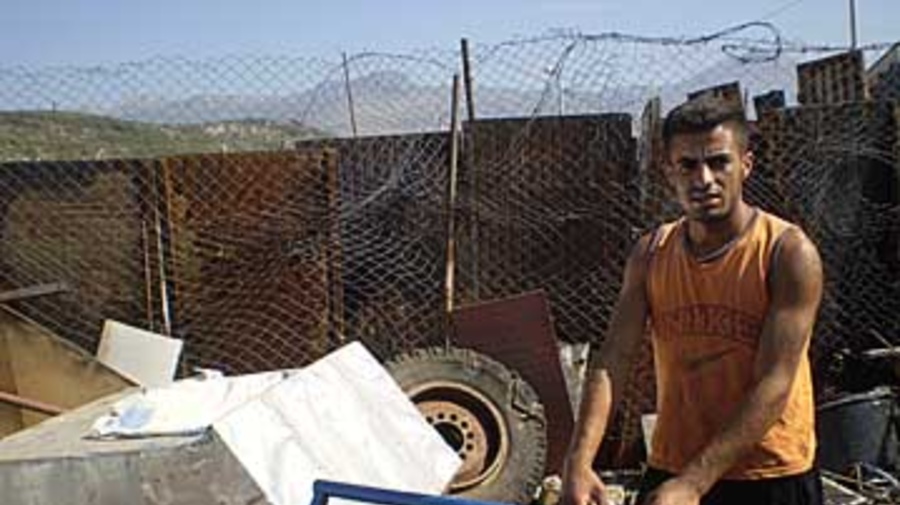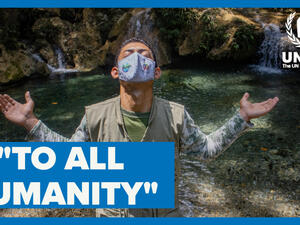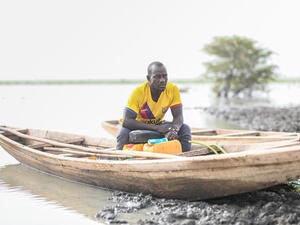World Environment Day: Roma scrap collectors get by in Montenegro camp
World Environment Day: Roma scrap collectors get by in Montenegro camp

Sebastian out looking for scrap metal. The 22-year-old supports his family with his recycling activity.
KONIK, Montenegro, June 5 (UNHCR) - Sebastian Krasnici is a modern-day rag and bone man,* touring the Montenegrin capital, Podgorica, from morning to night on his tricycle in a daily quest for scraps of iron, copper and aluminium.
The 22-year-old is just one of many ethnic Roma, Ashkalia, and Egyptian refugees who earn a living by collecting recyclable waste in this small Balkans nation, which most of them fled to from neighbouring Kosovo in 1999.
Sebastian is the family breadwinner, bringing in enough money to feed his family of seven members in Konik, a suburb of Podgorica and site of a refugee camp managed by the UN refugee agency. He has been living there for half his life, completing an elementary education through hard part-time studying.
Almost half of the 207 families (1,200 refugees) living in Konik earn their livelihood through recycling activities. Most, like Sebastian, deal in scrap metal, taking their haul to a scrap merchant like Skender Krasnici, who sells on to a steel plant in the city of Niksic - one tonne of iron waste fetches 120 euros - or to metal traders.
"Copper is the best paid material at 2.5 euros per kilo, but it is extremely hard to find," said 18-year-old Saku Valjorit, who runs a small garage in Konik. Aside from looking for scrap metal, he and his family also search for spare parts from old cars that can be used in his workshop.
People like Sebastian and Saku are not only making a living by collecting waste, they are also performing a vital environmental service. "They are clearing metal waste that would otherwise be a huge problem for the town," said Mensud Krpuljevic, a Red Cross of Montenegro official who runs Konik camp for UNHCR.
He said the municipal authorities did not have the resources needed to remove the waste, nor the mechanisms necessary for its sale or disposal. Construction of a special landfill with an attached recycling plant is under way but is expected to take years to complete.
"The Roma are the only ones who conduct large-scale recycling in the country," Mensud noted, adding: "Their activity is extremely useful both for Montenegrin society and for their own community, and most importantly it enables families to earn a living and be less dependent on diminishing humanitarian assistance."
Skender Krasnici is more of a scrap merchant. He collects waste metal, but also buys it from his neighbours in Konik before selling on to the Niksic steel mill or metal traders. He has been able to create a scrapyard in Konik thanks to help from UNHCR and the Red Cross.
"Before coming to this camp, I had no clue about recycling," he said, adding that he became involved in the business when people seeking to dispose of heavy waste began calling him when they found out that he owned a truck.
"I travel to collect large iron waste, even in other cities. I dismantle old cars and trucks and bring them to the camp." Skender, who makes enough to live comfortably with his family, concluded: "This is better than stealing or begging."
But some of those Konik residents not involved in the trade are not happy about all the recycling activity. They complain about the trucks that come to pick up iron for the Niksic plant and about the piles of metal waste waiting to be taken away.
Serge Ducasse, UNHCR's representative in Montenegro, said this was unfortunate but perhaps inevitable in a camp that was only meant to be temporary when it opened in 1998. "There are no easy solutions," he said, while noting that UNHCR and other agencies had over the years supported activities and training aimed at making the people of Konik self-sufficient.
"Even when they are poor and illiterate, refugees can contribute to their adoptive society in various ways, and this recycling activity is a very concrete example of refugees contributing to the host community," he said.
Some 24,000 refugees from Croatia, Bosnia Herzegovina and Kosovo are still residing in Montenegro. About 4,300 are ethnic Roma, Ashkalia or Egyptian.
* Rag-and-bone men were once a common sight on the streets of Britain's cities. Essentially junk dealers, they travelled in horsedrawn carts and collected old rags, bones for making glue, scrap iron and other items.
By Gordana Popovic in Konik, Montenegro









